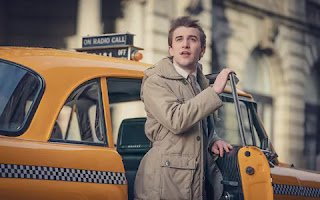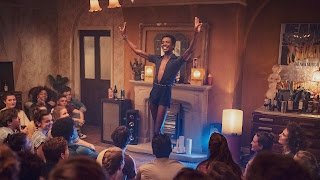It’s a Sin is a television master class from Russell T Davies.
Telling the story of a group of five friends who decide to share a flat in London in the early ’80s, and tracking their path as HIV and AIDS ravage their social group, we get to see the joy and exuberance of youth, with all their potential reaching out ahead of them, only to then see those lives crash into the horror of a pandemic that spares no one it touches.
Given a new perspective with the COVID-19 pandemic, it is hard not to empathise with these young lives as half are dashed and lost to the pandemic, leaving the survivors racked with guilt and pain about moving on without their friends.
There are so many pitfalls that could have tempted Davies to run off course, as his narrative is fraught with all the negatives that ran alongside the HIV/AIDS pandemic that would still risk alienating mainstream viewers. These negatives are born out of homophobia and ignorance, and general disdain from the mainstream public to people who are different.
It's a Sin bubbles with joy and the celebration of life. It touches on almost every relevant aspect during those tumultuous times, but Davies shows his immeasurable talent to avoid getting on a soapbox and preaching. He allows these aspects to run alongside the story without ever intruding on his narrative.
Beautifully cast with Olly Alexander as Richie Tozer, the character, who along with Jill played by, Lydia West, forms the heart of the group who all come together to live in the pink palace. This London apartment houses an eclectic group of five: Ritchie, Jill, Ash (Nathaniel Curtis), Roscoe (Omari Douglas) and Colin (Callum Scott Howells).
Colin’s story delivers one of the emotional high points of the show. His innocence, shy and slightly naïve character, with only one sexual partner behind him and designs on a very humble life, is one of the first to succumb to a disease that didn’t discriminate based on sexual promiscuity.
It is hard not to break down in tears when he delivers some of the most emotional lines of the entire series, as he tries to make sense of what is happening to him. It is Davies way of saying this disease was unfair, that it didn’t seek out those who were sexually promiscuous, that it could touch everyone no matter what their situation or sexual history. Davies also deftly makes the point that sexual exploration and enjoyment is a natural part of young lives and shouldn’t be stigmatised or avoided, despite what the ‘just say no’ and ‘stay celibate’ brigade tend to promote.
There are dozens of moments where Davies manages to get these sorts of messages across in anything but a heavy-handed way, and never with any other effect than to strengthen his visual storytelling. He briefly highlights issues that could themselves be a central story narrative for a movie or miniseries, and often the impact of these moments are immense while their screen time is fleeting. The mother of a young boy who we only see a glimpse of early in the series, comes angrily into the hospital to confront those in charge of the HIV ward to find out how and why they would think her rugged, manly son could be mixed in with those struck down by this gay disease? There is no other comment made by Davies than to allow this moment to resonate and make its point clearly without it ever being laboured. This entire story of a devasted mother and her son's unwilling outing is visually told and ended in a twenty-second sequence that smacks you right between your eyes.
He does the same with the terror and confusion in the early years of the disease, regarding the information available on how the disease is caught and transmitted. Showering and scrubbing the skin after Jill tends for the first of her immediate friends to fall ill, and that friend’s desperation to keep his news secret from his other friends. Clothes are burnt, and possessions thrown into bonfires rather than touched by those who love the victims struck down by the disease.
At one point, with Jill caring for Greg, an older member of their group and played perfectly by David Carlyle, she’s surprised when her friends show up with him at their apartment, and Greg announces he’s feeling better. Jill watches him drink from one of the apartments coffee mugs. We then see Jill scrub the mug twice; then, she decides to put the mug at the very back of the cup cupboard. As she tries to sleep, the paranoia over that cup keeps her awake, and she gets up to throw it in the bin rather than let any of her friends drink from it. Still unable to sleep, she gets up a second time, takes that cup from the bin and smashes it into pieces. It’s a beautiful visual representation of just how paranoid and terrified everyone was about the disease in those early years when the uncertainty and confusion reigned around how it was caught.
There’s a great deal made in the press about the use of gay actors to play gay roles. I find this counter-productive but until openly gay actors start getting cast in straight roles on the strength of their ability and not overlooked because of their sexuality and a belief an audience won’t accept them in a straight role, I’m willing to overlook them this redress.
Amari Douglas has the most fun camping it up, but it’s in the scenes with his African family, with traditional customs and superstitions that he comes into his own. It’s an extraordinary storyline that sees his father go from a homophobic evangelist to a man who recognises his son’s safety and happiness must be his primary concern. It’s a story of a second-generation immigrant and only enriches the front and centre drama, as Roscoe moves into the Pink Palace.
Equally noteworthy are Stephen Fry and Neil Patrick Harris, Fry as the politician with his ‘boy’, and a fantastic lunch scene with several other conservative politicians, all with their boys silent but sneering at each other across a lunch table at a cloistered club.
Harris warms up in his role as a stuffy English retail assistant in a Saville Row bespoke tailoring shop. His initial appearance comes across more a caricature of the older style English gentleman than a three-dimensional character addicted to manners and protocol. As he lets down his guard and mentors young Colin into gay life in London, we understand his mask is one he’s worn for a lifetime while living his real-life behind closed doors and safe-space venues with his partner of thirty years. When the first wave of the disease hits this couple’s closeted lives, we get yet another immense moment hidden by its brevity. The long-time companions are separated to die apart as families with more rights to their relative than a legally unrecognised partnership of thirty years, move to care for their loved one. These two men in their fifties die alone, separated, with neither understanding what has befallen them, mistakenly blaming domestic decisions with detergents or mold, and marvelling at the tragedy of both being hit with terminal diseases that seem random and unrelated. This story of separation due to a lack of legal standing has played out untold times across the ages of gay history, although it became particularly cruel during the AIDS pandemic.
Activists are trying to warn young gay revellers who dismiss their warnings of a gay disease as ludicrous and some sort of grand conspiratorial rumour started by the gay-hating conservative elements. As news of disease, largely cancer or other serious illness, seeks out and targets gay men, Ritchie Tozer loudly decries, “I don’t believe it because I’m not stupid.” It did sound stupid in those early years, these random, terminal illnesses befalling mostly gay men. Rumours swirled about poppers (Amyl Nitrate), being a cause, about a link to gay saunas, you could catch it off surfaces, it was born in a lab to target the gay population and on and on it went in an eerily similar rumour file to today’s pandemic.
The bravest member of the cast is possibly Nathaniel Hall, who has done much to dispel the stigma of those living with HIV through his one-man show, “First Time”. His show details how he caught HIV from his first sexual experience at sixteen and will hopefully be streaming sometime soon.
Cast as Ritchie’s boyfriend, Donald Bassett, one of the many young men who silently disappeared to their parents, never to be seen again, his inclusion in the cast is more than a nice touch; it’s an important statement. HIV is now managed by 29 million people worldwide, and almost fifty per cent of these are heterosexual. Most manage their condition so well they have an undetectable viral load with no chance of transmission. Hall holds his own alongside the extraordinarily multi-talented Olly Alexander.
There is so much to love and to cry about in watching It’s a Sin. Every cast and crew member can be rightly proud for playing their part in bringing such a series to life. It is a story that needs telling. Russel T Davies has taken forty years to gain enough composure to make sense of his experiences and find a story that entertains above all else. He has managed to include all aspects of a horrific world event that didn’t spare any demographic but tended to concentrate on some more than others.
Be brave enough to watch, but don’t do it lightly. You will need time to think and gather yourself for this one, possibly with a pause or two between episodes. You cannot help but be deeply affected, but if, like myself, you were alive and out during those times, you may be affected more than others. It’s a Sin is so well rendered; I found scenes I lived and words I heard spoken that I put to rest many years ago, only for them to jump out and grab me like I was reliving those moments again.
It’s a Sin is the best of premier television and will likely be a favourite tear-jerker to be streamed and discovered for years to come.
5 pink stars for this one.
There is so much in this interview that I recognise in my own story. It makes sense that I would relate so strongly to It’s a Sin. I'm aware this relationship to the material may have made the series feel more impactful to me than it will prove for others.



















